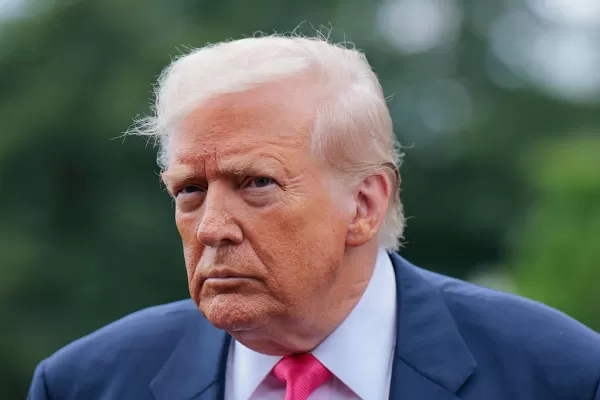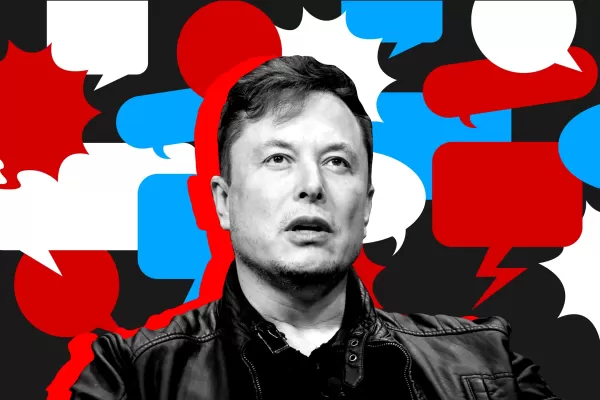Trump Prioritizes AI Growth Over Regulation in Race to Outpace China

The Trump administration unveiled its landmark AI Action Plan on Wednesday, marking a decisive break from the Biden administration's risk-averse AI policies. The ambitious blueprint prioritizes aggressive infrastructure development, sweeping regulatory rollbacks, enhanced national security measures, and strategic competition with China in artificial intelligence.
The policy shift could have broad economic and societal impacts, particularly regarding energy usage and environmental regulations. The administration proposes expanding data center construction, including on federal lands, while potentially relaxing environmental protections during peak energy demands - decisions that could affect both industry and consumers.
Implementation details remain fluid, reflecting the plan's nature as a strategic framework rather than rigid playbook. However, the central philosophy emerges clearly: unconstrained technological advancement takes precedence over cautious oversight.
Administration officials frame this as essential for achieving "a new era of American prosperity," justifying massive public investment in digital infrastructure. The proposal includes workforce training initiatives and local government partnerships to create data center-related jobs.
"American innovation must operate without artificial constraints," Trump stated. "We reject climate extremism and bureaucratic paralysis that would surrender our technological future to China. Our motto is simple: Build, Build, Build!"
The document was developed by a tech-focused policy team including OSTP Director Michael Kratsios, AI Advisor David Sacks, and National Security Assistant Marco Rubio, incorporating input from over 10,000 stakeholder groups.
Regulatory Restraints and the AI Moratorium
The administration is reviving efforts to prevent state-level AI regulation after a failed attempt to impose a 10-year moratorium through the federal budget process. The new strategy would condition federal funding on states abstaining from AI oversight.
The plan empowers the FCC to intervene when state AI policies potentially affect communications infrastructure - a sweeping authority given AI's ubiquitous digital footprint.
At the federal level, agencies will identify and potentially eliminate existing regulations deemed to restrict AI innovation, based on industry and public feedback.
Streamlining Data Center Development
The administration targets environmental regulations like NEPA, the Clean Air Act, and Clean Water Act as obstacles to building AI infrastructure. The plan proposes:
- Creating regulatory exemptions for critical projects
- Accelerating permitting procedures
- Expanding fast-track programs like FAST-41
- Opening federal lands for development
This comes amid criticism of tech companies like xAI and Meta for environmental impact, including allegations of circumventing safeguards at xAI's Memphis data center.
The strategy also emphasizes energy grid stability and privileged power access for AI companies during critical periods.
The Neutrality Debate in AI Systems
The plan prominently addresses concerns about "biased AI," mandating federal contractors ensure their AI systems reflect "American values" by avoiding perceived ideological biases around issues like:
- Misinformation policies
- Diversity initiatives
- Climate change frameworks
Legal experts caution this approach raises constitutional concerns. "Mandating neutrality could violate the First Amendment unless carefully structured," noted constitutional scholar Eugene Volokh.
The policy could significantly impact major government AI contractors including Anthropic, xAI, Google and OpenAI, which collectively hold hundreds of millions in defense contracts.
Promoting Open AI Development
The strategy actively encourages open-source AI models as a counter to Chinese technological advances, proposing:
- Public computing resources for AI researchers
- Partnerships with private AI developers
- Support for open-model organizations
This could benefit companies like Meta, AI2 and Hugging Face that champion open AI development.
Security Priorities
The plan includes limited safety measures focused on:
- AI interpretability research
- Cybersecurity testing via government hackathons
- Assessing biological/chemical weapon risks
Notably absent are rigorous safety reporting requirements imposed under previous administrations.
China Countermeasures
Nearly one-quarter of the document focuses on Chinese competition, directing agencies to:
- Monitor foreign AI developments
- Evaluate Chinese models for political alignment
- Assess adversary AI capabilities
- Secure defense-related computing resources
The plan emphasizes integrating AI across military and intelligence operations while protecting against foreign technological threats.
Related article
 YouTube Integrates Veo 3 AI Video Tool Directly Into Shorts Platform
YouTube Shorts to Feature Veo 3 AI Video Model This SummerYouTube CEO Neal Mohan revealed during his Cannes Lions keynote that the platform's cutting-edge Veo 3 AI video generation technology will debut on YouTube Shorts later this summer. This follo
YouTube Integrates Veo 3 AI Video Tool Directly Into Shorts Platform
YouTube Shorts to Feature Veo 3 AI Video Model This SummerYouTube CEO Neal Mohan revealed during his Cannes Lions keynote that the platform's cutting-edge Veo 3 AI video generation technology will debut on YouTube Shorts later this summer. This follo
 Google Cloud Powers Breakthroughs in Scientific Research and Discovery
The digital revolution is transforming scientific methodologies through unprecedented computational capabilities. Cutting-edge technologies now augment both theoretical frameworks and laboratory experiments, propelling breakthroughs across discipline
Google Cloud Powers Breakthroughs in Scientific Research and Discovery
The digital revolution is transforming scientific methodologies through unprecedented computational capabilities. Cutting-edge technologies now augment both theoretical frameworks and laboratory experiments, propelling breakthroughs across discipline
 Elon Musk's Grok AI Seeks Owner's Input Before Tackling Complex Queries
The recently released Grok AI—promoted by Elon Musk as a "maximally truth-seeking" system—has drawn attention for its tendency to consult Musk's public statements before responding to politically sensitive topics. Observers note that when addressing
Comments (0)
0/200
Elon Musk's Grok AI Seeks Owner's Input Before Tackling Complex Queries
The recently released Grok AI—promoted by Elon Musk as a "maximally truth-seeking" system—has drawn attention for its tendency to consult Musk's public statements before responding to politically sensitive topics. Observers note that when addressing
Comments (0)
0/200

The Trump administration unveiled its landmark AI Action Plan on Wednesday, marking a decisive break from the Biden administration's risk-averse AI policies. The ambitious blueprint prioritizes aggressive infrastructure development, sweeping regulatory rollbacks, enhanced national security measures, and strategic competition with China in artificial intelligence.
The policy shift could have broad economic and societal impacts, particularly regarding energy usage and environmental regulations. The administration proposes expanding data center construction, including on federal lands, while potentially relaxing environmental protections during peak energy demands - decisions that could affect both industry and consumers.
Implementation details remain fluid, reflecting the plan's nature as a strategic framework rather than rigid playbook. However, the central philosophy emerges clearly: unconstrained technological advancement takes precedence over cautious oversight.
Administration officials frame this as essential for achieving "a new era of American prosperity," justifying massive public investment in digital infrastructure. The proposal includes workforce training initiatives and local government partnerships to create data center-related jobs.
"American innovation must operate without artificial constraints," Trump stated. "We reject climate extremism and bureaucratic paralysis that would surrender our technological future to China. Our motto is simple: Build, Build, Build!"
The document was developed by a tech-focused policy team including OSTP Director Michael Kratsios, AI Advisor David Sacks, and National Security Assistant Marco Rubio, incorporating input from over 10,000 stakeholder groups.
Regulatory Restraints and the AI Moratorium
The administration is reviving efforts to prevent state-level AI regulation after a failed attempt to impose a 10-year moratorium through the federal budget process. The new strategy would condition federal funding on states abstaining from AI oversight.
The plan empowers the FCC to intervene when state AI policies potentially affect communications infrastructure - a sweeping authority given AI's ubiquitous digital footprint.
At the federal level, agencies will identify and potentially eliminate existing regulations deemed to restrict AI innovation, based on industry and public feedback.
Streamlining Data Center Development
The administration targets environmental regulations like NEPA, the Clean Air Act, and Clean Water Act as obstacles to building AI infrastructure. The plan proposes:
- Creating regulatory exemptions for critical projects
- Accelerating permitting procedures
- Expanding fast-track programs like FAST-41
- Opening federal lands for development
This comes amid criticism of tech companies like xAI and Meta for environmental impact, including allegations of circumventing safeguards at xAI's Memphis data center.
The strategy also emphasizes energy grid stability and privileged power access for AI companies during critical periods.
The Neutrality Debate in AI Systems
The plan prominently addresses concerns about "biased AI," mandating federal contractors ensure their AI systems reflect "American values" by avoiding perceived ideological biases around issues like:
- Misinformation policies
- Diversity initiatives
- Climate change frameworks
Legal experts caution this approach raises constitutional concerns. "Mandating neutrality could violate the First Amendment unless carefully structured," noted constitutional scholar Eugene Volokh.
The policy could significantly impact major government AI contractors including Anthropic, xAI, Google and OpenAI, which collectively hold hundreds of millions in defense contracts.
Promoting Open AI Development
The strategy actively encourages open-source AI models as a counter to Chinese technological advances, proposing:
- Public computing resources for AI researchers
- Partnerships with private AI developers
- Support for open-model organizations
This could benefit companies like Meta, AI2 and Hugging Face that champion open AI development.
Security Priorities
The plan includes limited safety measures focused on:
- AI interpretability research
- Cybersecurity testing via government hackathons
- Assessing biological/chemical weapon risks
Notably absent are rigorous safety reporting requirements imposed under previous administrations.
China Countermeasures
Nearly one-quarter of the document focuses on Chinese competition, directing agencies to:
- Monitor foreign AI developments
- Evaluate Chinese models for political alignment
- Assess adversary AI capabilities
- Secure defense-related computing resources
The plan emphasizes integrating AI across military and intelligence operations while protecting against foreign technological threats.
 YouTube Integrates Veo 3 AI Video Tool Directly Into Shorts Platform
YouTube Shorts to Feature Veo 3 AI Video Model This SummerYouTube CEO Neal Mohan revealed during his Cannes Lions keynote that the platform's cutting-edge Veo 3 AI video generation technology will debut on YouTube Shorts later this summer. This follo
YouTube Integrates Veo 3 AI Video Tool Directly Into Shorts Platform
YouTube Shorts to Feature Veo 3 AI Video Model This SummerYouTube CEO Neal Mohan revealed during his Cannes Lions keynote that the platform's cutting-edge Veo 3 AI video generation technology will debut on YouTube Shorts later this summer. This follo
 Google Cloud Powers Breakthroughs in Scientific Research and Discovery
The digital revolution is transforming scientific methodologies through unprecedented computational capabilities. Cutting-edge technologies now augment both theoretical frameworks and laboratory experiments, propelling breakthroughs across discipline
Google Cloud Powers Breakthroughs in Scientific Research and Discovery
The digital revolution is transforming scientific methodologies through unprecedented computational capabilities. Cutting-edge technologies now augment both theoretical frameworks and laboratory experiments, propelling breakthroughs across discipline
 Elon Musk's Grok AI Seeks Owner's Input Before Tackling Complex Queries
The recently released Grok AI—promoted by Elon Musk as a "maximally truth-seeking" system—has drawn attention for its tendency to consult Musk's public statements before responding to politically sensitive topics. Observers note that when addressing
Elon Musk's Grok AI Seeks Owner's Input Before Tackling Complex Queries
The recently released Grok AI—promoted by Elon Musk as a "maximally truth-seeking" system—has drawn attention for its tendency to consult Musk's public statements before responding to politically sensitive topics. Observers note that when addressing





























